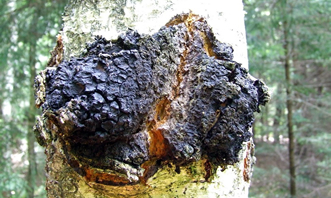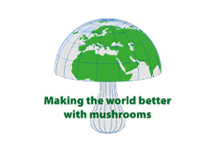Source of Information: Memorial Sloan Kettering Cancer Center, the oldest and largest private cancer center, located in New York, founded in 1884.
Scientific Name: Inonotus obliquus
Common Name: Cinder conk, birch conk, clinker polypore

How It Works
Bottom Line: Research is underway to determine the anticancer and immunostimulating effecs of chaga mushroom.
Chaga mushroom is found in Russia and has been used in traditional medicine. Studies show its constituents can kill cancer cells selectively and can stimulate the immune system. However, clinical trials are needed to verify chaga’s safety and effectiveness as a cancer treatment in humans.
- To prevent and treat cancer
Previous studies have shown that chaga can inhibit the progression of certain cancers and activate subsets of immune cells. Research is in progress to study its anticancer effects in humans. - To stimulate the immune system
Chaga stimulated the activity of certain immune cells in laboratory-based experiments. - To reduce inflammation
No scientific evidence supports this use. - To protect the liver
No scientific evidence supports this use.
Chaga has been shown to aid in treatment of certain cancers. More studies are being conducted to confirm its effects as an anticancer agent in humans.
- You are using a “blood thinning” drug.
- You are using medications to lower blood sugar (chaga may have additive effects).
No side effects have been reported.
Chaga mushroom, found on Birch and other trees in cold climates, has been used in folk medicine in Russia and other North European countries for generations. Chaga draws nutrients from the tree on which it grows and extracts are typically derived from the inner layers of the bark. The active constituents are thought to be a combination of triterpenes, such as betulinic acid, sterols, and polysaccharides. Chaga has demonstrated anticancer, antiviral, antiplatelet (2), anti-inflammatory, analgesic (3), immune stimulating properties in vitro, and hypoglycemic effects in mice (4). Chaga extract has inhibitory and proapoptotic effects against colon cancer (5) and hepatoma (1) cells. It also reduced toxicity associated with radiation (6) and inhibited tumor cell growth in animal models (7). In some studies, Chaga demonstrates selective apoptosis in tumor cells with no effects on healthy cells (1).
No clinical trials have been conducted to assess chaga’s safety and efficacy for disease prevention or for the treatment of cancer, cardiovascular disease, or diabetes.
Constituents of chaga mushroom extract may interact with anticoagulant and antidiabetic drugs.
Although chaga is an edible fungus, it is not commonly ingested due to its bitter nature. Tea can be made from the whole mushroom.
- Antiviral
- Anti-inflammatory
- Antimutagenic
- Immunostimulation
- Cancer treatment
- Hepatoprotective
Triterpenes: Inotodiol, Lanosterol, Ergosterol, Betulinic acid (Betulin) (10)
Chaga demonstrated hypoglycemic effects in mice with diabetes mellitus (4). It’s anti-inflammatory and pain relieving properties are thought to be via inhibition of nitric oxide synthase (iNOS) and cyclooxygenase-2 (COX-2) (3). An extract of chaga reduced the oxidative stress in lymphocytes from patients with from inflammatory bowel disease (8). Chaga also showed anti-mutagenic properties (9). A hot water extract of chaga exhibited inhibitory and proapoptotic actions against colon cancer cell proliferation via up-regulation of Bax and caspase-3 and down-regulation of Bcl-2 (5). Aqueous extracts of chaga also inhibited growth of human hepatoma cells via arrest of the cell cycle in Go/G1 phase and inducing selective apoptosis (1). The selectivity may also be a result of activation from a change in the pH of the tumor microenvironment (11). Betulinic acid, a constituent of chaga, is cytotoxic and triggers apoptosis through a direct effect on the mitochondria of cancer cells. Other apoptosis-inducing factors result in cleavage of caspases and nuclear fragmentation (7). Like many medicinal mushrooms, chaga is rich in beta glucans which have immunomodulating activities. Beta glucans bind to Complement Receptor 3 (CR3) that allows the immune cells to recognize cancer cells as “non-self” (10).
None reported.
- Antiplatelet or anticoagulant drugs: Chaga extract can inhibit platelet aggregation (2). It may also have additive anticoagulant effects.
- Hypoglycemic agents: May have additive effect in lowering blood sugar levels.
Purpose of this published study is scientific information and education, it should not be used for diagnosing or treating a health problem or disease. This website is designed for general education and information purposes only and does not substitute for professional medical advice, examination, diagnosis or treatment.
Source of Information: Memorial Sloan Kettering Cancer Center, the oldest and largest private cancer center, located in New York, founded in 1884.
- Youn MJ, Kim JK, Park SY, et al. Chaga mushroom (Inonotus obliquus) induces G0/G1 arrest and apoptosis in human hepatoma HepG2 cells. World J Gastroenterol. Jan 28 2008;14(4):511-517.
- Hyun KW, Jeong SC, Lee DH, Park JS, Lee JS. Isolation and characterization of a novel platelet aggregation inhibitory peptide from the medicinal mushroom, Inonotus obliquus. Peptides. Jun 2006;27(6):1173-1178.
- Park YM, Won JH, Kim YH, et al. In vivo and in vitro anti-inflammatory and anti-nociceptive effects of the methanol extract of Inonotus obliquus. J Ethnopharmacol. Oct 3 2005;101(1-3):120-128.
- Sun JE, Ao ZH, Lu ZM, et al. Antihyperglycemic and antilipidperoxidative effects of dry matter of culture broth of Inonotus obliquus in submerged culture on normal and alloxan-diabetes mice. J Ethnopharmacol. Jun 19 2008;118(1):7-13.
- Lee SH, Hwang HS, Yun JW. Antitumor activity of water extract of a mushroom, Inonotus obliquus, against HT-29 human colon cancer cells. Phytother Res. Apr 15 2009.
- Zhong XH, Ren K, Lu SJ, Yang SY, Sun DZ. Progress of research on Inonotus obliquus. Chin J Integr Med. Apr 2009;15(2):156-160.
- Youn MJ, Kim JK, Park SY, et al. Potential anticancer properties of the water extract of Inonotus [corrected] obliquus by induction of apoptosis in melanoma B16-F10 cells. J Ethnopharmacol. Jan 21 2009;121(2):221-228.
- Najafzadeh M, Reynolds PD, Baumgartner A, Jerwood D, Anderson D. Chaga mushroom extract inhibits oxidative DNA damage in lymphocytes of patients with inflammatory bowel disease. Biofactors. 2007;31(3-4):191-200.
- Ham SS, Kim SH, Moon SY, et al. Antimutagenic effects of subfractions of Chaga mushroom (Inonotus obliquus) extract. Mutat Res. Jan 10 2009;672(1):55-59.
- Caifa Chen WZ, Gao X, Xiang X, et al. Aqueous Extract of Inonotus obliquus (Fr.) Pilat (Hymenochaetaceae) Significantly Inhibits the Growth of Sarcoma 180 by Inducing Apoptosis. Am J Pharmacol Toxicol. 2007. 2(1):10-17.
- Shashkina MY, Shashkin PN, Sergeev AV. Chemical and Medicobiological Properties of Chaga (Review). Pharmaceutical Chemistry Journal 2006. 40(10):560-568.
